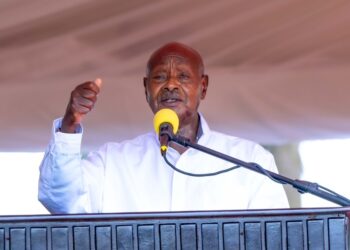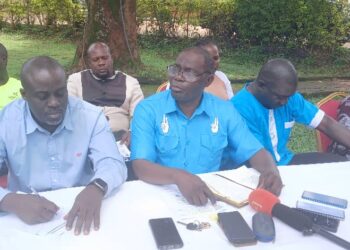By our reporter
The Auditor General (AG) has faulted Central Bank Governor Emmanuel Mutebile for the closure of atleast seven commercial banks. The findings, released in a special report on defunct banks presented to Parliament yesterday, also revealed serious weaknesses in the management of the Central Bank.
Auditor General John Muwanga, punched holes in BoU’s closure of Teefe Bank (1993), International Credit Bank Ltd (1998), Greenland Bank (1999), The Co-operative Bank (1999), National Bank of Commerce (2012), Global Trust Bank (2014) and the sale of Crane Bank Ltd (CBL) to dfcu (2016).
“I observed that there were no guidelines/regulations or policies in place to guide the identification of the purchases of the defunct banks. There were also no guidelines to determine the procedures to be adopted by Central Bank in the sale/ transfer of assets and liabilities of the defunct banks to the identified purchaser,” Mr Muwanga notes.
The AG says the Purchase of Assets and Assumption of Liabilities (P&A) deal BoU officials signed with Dfcu on January 25, 2017 for the purchase of Crane Bank Limited, formerly owned by tycoon Sudhir Ruparelia and others, didn’t follow the right procedures.
“I was not provided with the negotiation minutes leading to the P&A agreement. In the absence of the minutes, I could not determine how BoU selected the best evaluated bidder and how the terms in P& A were determined,” the report adds.
When it came to the valuation of assets and liabilities of CBL before the dfcu take over of the bank at Sh200 billion, the AG said, “On April 10, 2018, I requested for P&A agreement, including details of the assets and liabilities transferred after taking into account the requisite valuation. I noted that BoU did not carry out a valuation of the assets and liabilities of CBL. In the absence of the valuation, I could not establish how the terms for the transfer of assets and liabilities in the P&A were determined.”
In a meeting with the BoU’s outgoing executive director of supervision, Ms Justine Bagyenda held on June 13, 2018, at BoU offices, the directors admitted that the BoU did not carry out a valuation of the CBL assets and liabilities but relied on inventory report and the due diligence undertaken by dfcu to arrive at P&A agreement.
“I also noted that the P&A did not have complete details of assets and liabilities transferred to dfcu with their corresponding values; I was therefore, unable to establish the status of assets and liabilities transferred to dfcu.”
The AG, however, says BoU officials gave him a soft copy of details of assets and liabilities although the information lacked details of loans and advances transferred to dfcu and evidence of valuation of assets before sale hence it was insufficient to respond to his observation.
The 94-page special audit report was yesterday laid in Parliament and the Speaker forwarded it to the Committee on Commissions, Statutory Authorities and State Enterprises (Cosase) for scrutiny.
At an appropriate time, BoU officials and other stakeholders/witnesses will be summoned to the committee to answer queries raised by the AG before a committee report is sent to parliament for debate.
Mr Mutebile and his team have also been questioned on the expenditure of more than Shs478.8b they say was for liquidity support and other interventions in CBL after they took over the management on October 20 2016.
The AG enquired into the source of the money BoU injected in CBL and wondered how Mr Mutebile’s team arrived at Shs478.8b.
For compiling the inventory report, forensic review and investigations, IT support and hiring of external lawyers, BoU officials spent Shs12.2b.
This money is part of the Shs478.8b they say was injected in CBL. The AG, according to sources, has requested Cosase to investigate the expenditure of these funds.
Although the AG wondered how the taxpayers’ money will be recovered, in the exit meeting with AG officials held on June 22, 2018, Mr Mutebile’s team explained that the money in question was sourced from within BoU budget and that it will be recovered from the CBL shareholders.
However, CBL shareholders have accused BoU officials of writing off loans with collateral and other supporting documents.
Other defunct banks
In the report, the AG says BoU sold assets of ICB, Greenland, Cooperative, GTB and NBC worth Shs164b at a discount of 80 per cent, yielding only Shs32b.
In the case of ICB, Greenland and Cooperative Bank, the total loan portfolio sold at Shs135b included secured loans of Shs34.5b which had valid legal, or equitable mortgage on the real property and were supported with legal documentation but were sold to Nile River Acquisition Company at a discount of 93 per cent.
Outstanding liabilities
It was also noted that the liabilities amounting to Shs503.7b were still outstanding at the time of writing the report (August 2018) from a total liability of Shs1.6 trillion held at closure.
For instance, the process of settling liabilities for ICB, Cooperative Bank and Greenland Bank has taken more than 17 years. The AG noted that this has affected the winding up process of these banks.
The AG preliminary report to Parliament also indicated that at least Shs23b from the sale of only Global Trust Bank (GTB) remained unaccounted for, 25 land titles missing, and customer loans inherited from closed banks were sold at an undervalued rate. GTB was closed in July 2014.
Background
The audit into the defunct banks was prompted by petitions from Crane Bank shareholders and Central Bank employees.
They petitioned Cosase, chaired by Mr Abdul Katuntu and demanded investigation into undisclosed BoU/dfcu deal and other issues in the closure of other banks.
Two whistle-blowers also petitioned Parliament and the IGG on the same matter, calling for an independent audit into the agreement BoU signed with dfcu Bank.
In one of the petitions, former Crane Bank shareholders allege that they were excluded in the negotiations of the bank’s sale contrary to provisions of the Financial Institutions Act. They also argued that the agreement did not state the value of liabilities or assets taken over by dfcu. In exercise of its powers under Section 87(3), 88(1)(a) & (b) of the Financial Institutions Act 2004, BoU took over CBL because it was insolvent.
The bank and Mr Sudhir are in court over the controversial sale of CBL to dfcu and recovery of about Shs397b BoU says went missing from CBL before liquidation.
Although MPs led by Budadiri West MP Nandala Mafabi wanted to table a motion to investigate BoU/CBL saga, Deputy Speaker Jacob Oulanyah had ruled that any such inquiry would be stayed until all related cases have been disposed of in court.
Quoting Mr Oulanyah’s letter, BoU Deputy Governor Louis Kasekende also on April 19 wrote to the Attorney General protesting the audit into the liquidation process of Crane Bank, saying the matter was in court.
The Solicitor General wrote back on May 2 telling BoU not to cooperate with either the Auditor General or Parliament regarding the investigation into the sale of Crane Bank. He said any such inquiry would be subjudice.
But On May 10, the Speaker of Parliament, Ms Rebecca Kadaga, wrote to Mr Muwanga, and asked him to ignore the Attorney General’s guidance on sub-judice rule. Ms Kadaga instructed Mr Muwanga to proceed with the audit as previously instructed by Mr Katuntu.
Do you have a story in your community or an opinion to share with us: Email us at editorial@watchdoguganda.com











